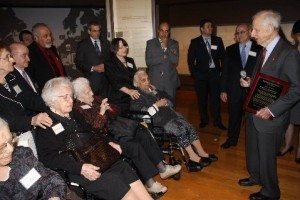The Museum of Jewish Heritage, located on the tip of Manhattan in Battery Park, on the shores of Ellis and Liberty Islands, served as the setting for the honoring of Ambassador Henry Morgenthau, Sr. and his family, including Robert M. Morgenthau, chairman of the Museum, by Armenian Genocide survivors and the Knights and Daughters of Vartan on Wednesday afternoon, April 21.

Four Armenian Genocide survivors, residents of the Armenian Home in Flushing, N.Y., met Robert Morgenthau in front of the museum’s special exhibition, which chronicles U.S. Ambassador to the Ottoman Empire Henry Morgenthau’s tireless efforts to stop what he termed “the murder of a nation” in his autobiography—an expression tantamount to “genocide,” a word not invented until 1944 by Raphael Lemkin who was reflecting on the attempted extermination of the Armenians.
Dr. Mary Papazian, the senior vice-president and provost of Lehman College, City University of New York, made opening remarks on behalf of Armenians worldwide. She said that the survivors and Robert Morgenthau had come together “in a special way, joining the present and the past, in an affirmation of the tragedy which befell the Armenians and Ambassador Morgenthau’s efforts to ameliorate their suffering.”
Dr. Papazian introduced each of the survivors, including Charlotte Kechejian, Oronik Eminian, Arsalo Dadir, and Perouz Kalousdian, and briefly told their stories of escaping during the genocide and eventually making their way to the United States. She noted that Ambassador Morgenthau worked on behalf of Armenian survivors after the genocide by supporting the efforts of the Near East Relief, authorized by the U.S. government. Papazian noted that he became the “voice to these victims.”
Ambassador Morgenthau returned to the United States in 1916 and published his memoir Ambassador Morgenthau’s Story, describing the atrocities committed by the Young Turk dictatorship in the Ottoman Empire.
Among the official documents on display is the noted 1915 telegram where he warned the U.S. State Department that a “campaign of race extermination” is being carried out under the pretext of putting down a revolt.
“The exhibition behind us celebrates the contributions of this remarkable man, a man of principal, who believed in humanity above politics,” said Papazian. “We’re here to honor the contributions your family’s made and express our deepest gratitude and thanks from Armenians worldwide.”
Papazian and Haig Deranian, the grand commander of the Knights of Vartan, presented Robert Morgenthau with a plaque.
“I’m very proud to receive this recognition for my grandfather’s role in struggling against the murder of a nation,” said Robert Morgenthau, 90. “It was a case where criminals took over government and proceeded to exterminate all Armenians living in the Ottoman Empire. Obviously, they did not succeed.”
“Armenians have good memories,” he continued. “They remember who their friends are. I thank you for this honor on behalf of my grandfather and my family.”


Morgenthau’s Genes Still Spreading Humanity
Morgenthau’s phrases are still alive
Will remain alive
Like any poet who felt with a nation
Mercilessly slayed,* without a real reason.
Morgenthau’s name can never vanish
By criminal hands, as they will remain illiterates,
They don’t know how to sign their correct names,
They lost even minute feelings …they killed without regrets.
But Morgenthau’s’ cohorts are still feeling
Their grandfather’s internal sufferings
In spite of almost a century elapsed.
As every verb in His book written with soulful hands.
Their genes are born to serve humanity
Such genes will continue to race
To abolish the inhumanity—
That birthed in creatures, who are born slayers.
Those should not breathe with any humanitarian race.
Those, who still pursue spreading poisons
And try slaying sufferers’ tongues and pens;
Those who want to live in peace with every religion and race.
___________________________________
* slayed; lyric verb for slain